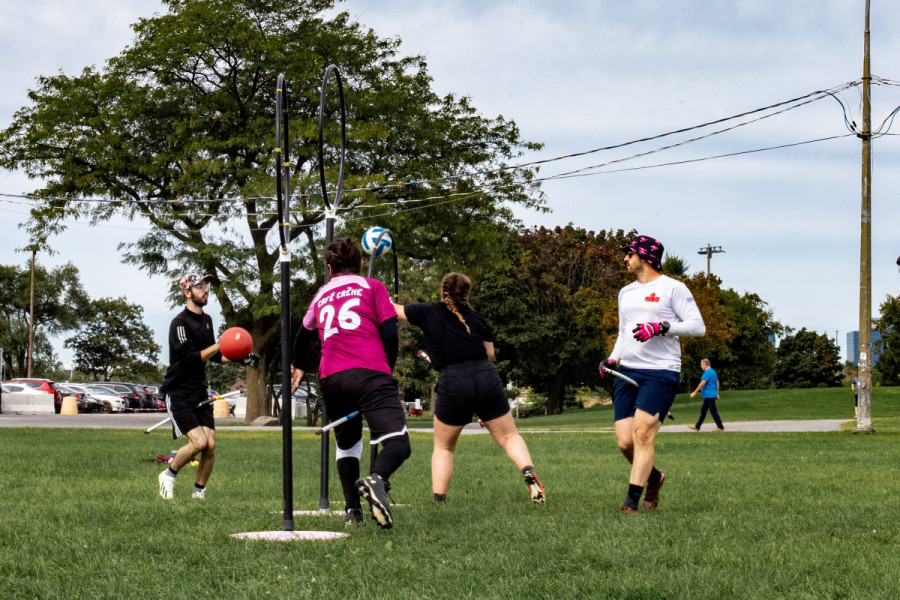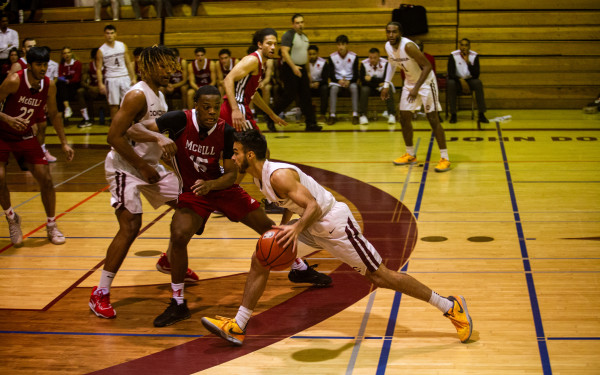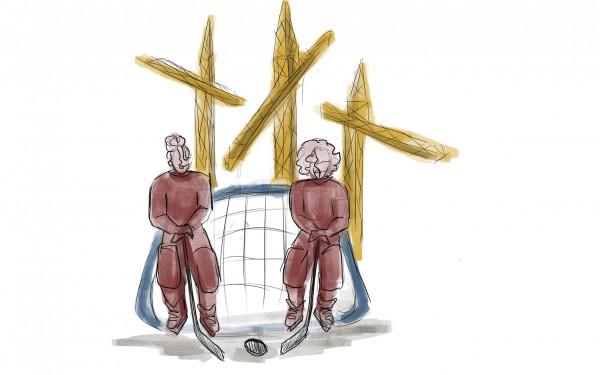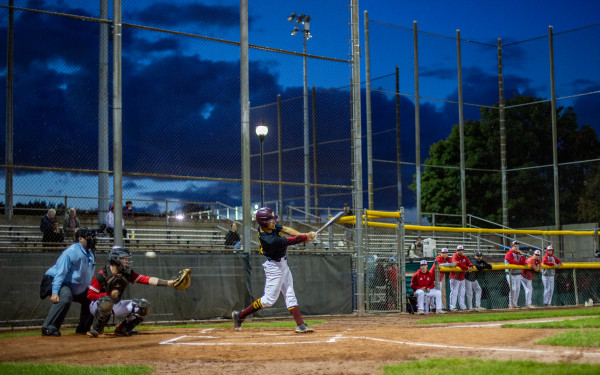The fun, chaotic and very real world of quadball
The Montreal Flamingos’ inclusive space for athletes who want to ditch traditional sports
Quadball, a genuine sport formerly known as Quidditch and inspired by the Harry Potter franchise, is aiming to cement itself in the Montreal sports scene. The Montreal Flamingos Quadball Club is at the centre of it all.
Blending aspects of basketball, rugby, handball and even dodgeball, quadball is an inherently complicated sport, but according to the Major League Quadball (MLQ) website, “chaos is a part of its charm.” This is exactly what participants love about it.
“It gives you space to discover different aspects of the sport and it also keeps the game fun. It's never the same,” said Julia Merlini, a quadball player of six years who is entering their second year with the Flamingos.
On the field, players are free to try multiple positions. A game will have six to seven players on the field for a team, occupying the positions of chaser, beater, keeper or seeker.
Quadball also requires teams to be mixed-gendered. A maximum of four players of the same gender identity can be on the pitch at the same time within a team.
There are four balls in play at all times, a quaffle (a slightly deflated volleyball) and three bludgers (dodgeballs).
Chasers score points with the quaffle while beaters attempt to temporarily remove the chasers from play with the bludgers and keepers prevent chasers from scoring. The seeker comes in the second half of play to catch the snitch runner—who is not a player but a game official. All players are mounted on broomsticks as a handicap.
The first iteration of quadball was played in 2005 in Vermont. Two years later, the International Quadball Association (IQA), who governs the rules of the sport, was founded. Given the sports’ nascent emergence, rule changes occur every year or two.
“It’s always evolving. Rule changes help increase not just the competitiveness of the sport, but the scoring chances, and make sure that the game moves quickly,” said Merlini.
The IQA has 19 full-time members from countries including amongst others Argentina, Germany and Canada. The Montreal Flamingos play within Quadball Canada, the national league, along with McGill University’s quadball team. Merlini themself had started playing with McGill, where she studied.
Having previously played rugby, Merlini was searching for team sports to play but avoided becoming a varsity athlete at McGill. They then stumbled upon the McGill quadball team practicing on campus.
After a quick dive into the team’s social media, Merlini was hooked. “I saw what they were about and certain activities they did. I was like, ‘That's for me,’” she said.
Merlini appreciated the tackling component of rugby in quadball without the competitiveness and stress of varsity sports.
Arguably the biggest change quadball underwent is the recent decision to change the name of the sport from quidditch to quadball. In July 2022, US Quadball, the MLQ and the IQA cited the anti-trans positions of the Harry Potter series author as a reason behind the rebranding.
“By distancing ourselves not only can we distinguish ourselves as this inclusive space, but also as a more serious sport,” said Merlini, emphasizing that fostering safe spaces for LGBTQIA2S+ athletes is a source of pride in quadball.
By distancing ourselves not only can we distinguish ourselves as this inclusive space, but also as a more serious sport. — Julia Merlini
Merlini added that many quadball players are not Harry Potter fans. Yang Ming Ma exemplifies this. A graduate student at McGill in kinesiology and physical education, Ma played with the McGill club throughout his undergraduate degree and now plays for the Flamingos. He had read a few books in the series, but the sports’ amusement was the main attraction.
Ma, as someone who tries to stay active, found the lack of competitive intensity in quadball to be a strong selling point. “It's very inclusive and everyone is welcome to join no matter your level of athletic skill,” he said.
Quadball may be gaining traction worldwide, but it remains on the downlow in Montreal. The Flamingos, who practice every Saturday morning at Jarry Park, have done most of their recruitment this season via word of mouth. That’s how Alex Gagnon came to join the team.
“[It allows me to get] out of the house and it's really good training,” he said.
It’s Gagnon’s first year playing and while he was confused with the gameplay at first, he quickly got the hang of it. “Once you start playing, you get it and you can't stop. It's a drug,” he laughed.
Merlini said resilience is a valuable trait for players that are still learning the sport: “Sure, athleticism and coordination on the pitch are important, but the most important thing to enjoy quadball is to not give up because it's such a complex sport, there are so many components.”
On Sept. 30, the Flamingos played and hosted their first tournament of the season—dubbed the Flaming’brawl—at Villeray Park. Boding well for the rest of the season, the team ended up winning the whole tournament.
Merlini said that the team is always looking for new players to join.
“We accept people of any gender identity and any level of athletic abilities,” they said. “We have a spot for you on the team and we will support you in every way that we can so you can learn the sport to its fullest extent.”
This article originally appeared in Volume 44, Issue 3, published October 3, 2023.







